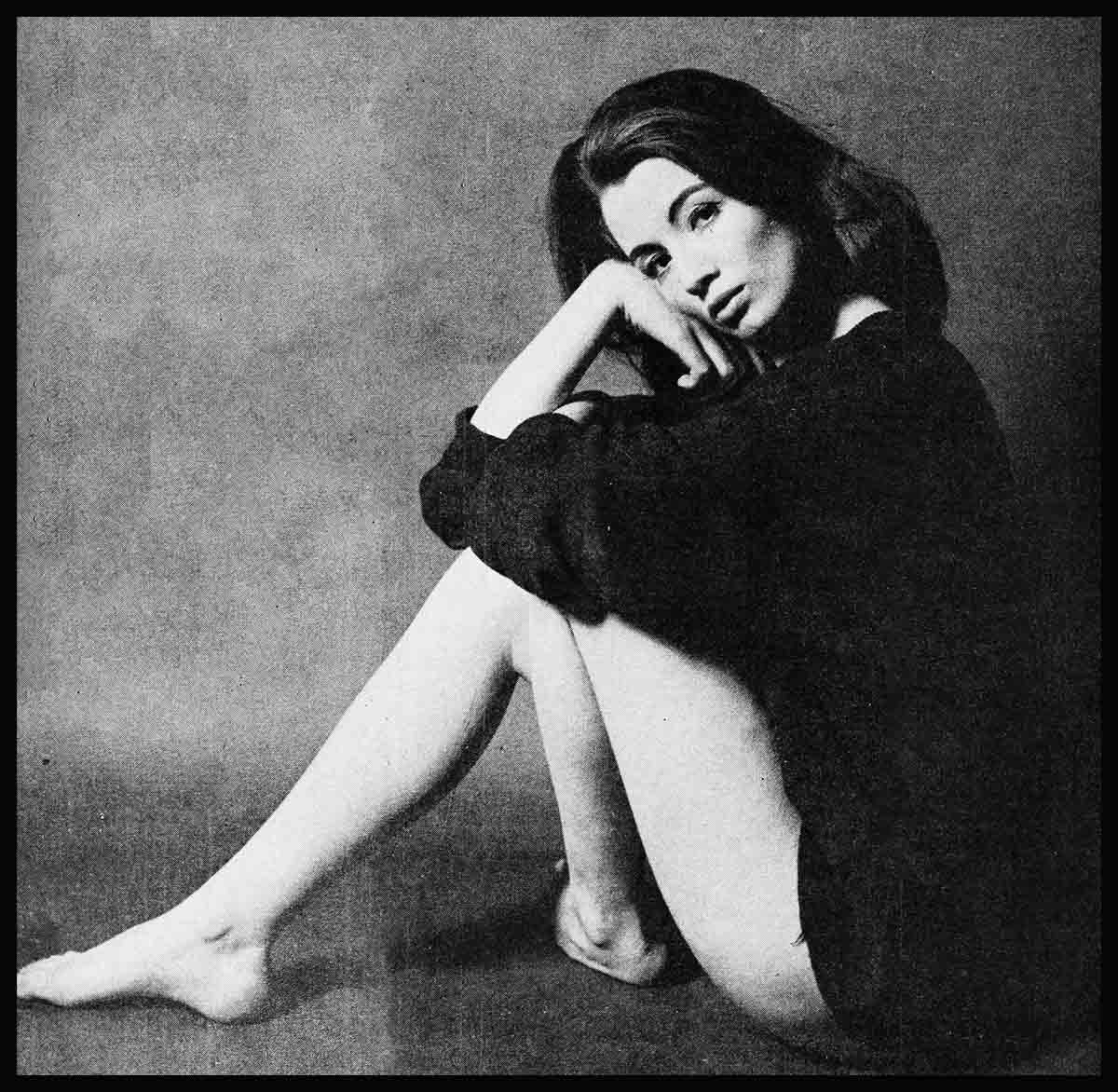
Christine Keeler—Her Naked Life
It was a muggy, moonlit July night when the fun began around the swimming pool at Lord Astor’s sumptuous Cliveden estate. As an alluring redhead frolicked in the pool, the silvery moonlight revealed that she was revealing a bit more than a guest at such a stately home should. She was nude!
That was back in 1961, and the ripples left in the pool by the nude bather have since grown with sensation piled upon sensation—until today it is a mighty wave that shakes an empire.
Things could have been much different in the Empire today had things been different that July night. Exact recollections of what transpired have been addled, perhaps by time and/or the temperature. But as best as all who were present can recall, the events that propelled a pretty young girl of nineteen from anonymity to notoriety went much the way a classic story of a temptress should go, with the hand of Fate directing from the wings.
Christine Keeler, from the very beginning, was a girl of mystery. The very beginning is one of the big London rail terminals and the time is 1956. She arrives from the provinces, suitcase in hand. A forlorn look of loneliness crosses her pretty face.
Behind her lies a past. It began with her father, whom she had never known. He left her mother when she was three months old. When she was three years old, her mother married an engineer and moved to the town of Wraysbury, just twenty miles west of London.
Even then, Christine knew what she wanted. It was the glamour and the glitter of the city that she was after. Her neighbors have recently reported that, “When she was just a little tyke, she’d climb on someone’s knee and say, Tell me about London, tell me about the clubs and the bright lights.’ ”
As she grew a little older her beauty made life in the near-slums more and more impossible. When she was barely into her teens, she had designed a home-made bikini that made jealous girlfriends dub her, the “Goddess of the Gravel Pits.”
Soon she was ready for life in the big city. She wanted to become a model. But the long, hard pull begins from the bottom of the heap and Christine became “a corny fifteen-year-old shop girl,” as she puts it.
Not long after her arrival in London, Christine moved up to modeling. But the pay wasn’t what she expected. And then she was pregnant, with an illegitimate, prematurely-born son, Peter, who died six days after his birth. She, after that, looked to showbusiness and got work in a night club—as a waitress. But the shimmering red hair and the slender, shapely body earned her a promotion to showgirl.
“And then I began to meet my first interesting male companions,” Christine related.
One was Stephen Ward, a forty-three-year-old socialite osteopath-artist who numbers among his patients and portrait sitters such widely disparate personages as Prince Philip and Elizabeth Taylor, as well as half the British cabinet.
Included among the latter was John Profumo, forty-eight, the Secretary of State for War and one of Britain’s most brilliant ministers. Called Jack by his friends, Profumo had come into his post, which has cabinet rank, in July, 1960. He was well-qualified for it.
The son of a baron of the late United Kingdom of Italy, a graduate of Harrow and Oxford, and an officer who rose from lieutenant to brigadier during World War II, Profumo had served in Commons since 1940, when he was twenty-five, the youngest member in history. In 1952, he began his climb to ministerial rank. In December, 1954, he married actress Valerie Hobson, who then gave up her twenty-year career on stage and screen. Valerie, who had two sons by a previous marriage, bore Jack a son, David, now eight.
It was almost a year to the day following his elevation to Prime Minister Harold Macmillan’s cabinet that Jack Profumo’s path crossed Christine Keeler’s—at the Cliveden estate swimming pool.
Fate and Dr. Ward had brought Christine and Jack to the crossroads at Cliveden, thirty miles west of London. Christine drove out to see Stephen, who was spending the weekend at his country cottage on Lord Astor’s magnificent estate.
We said it was a very warm night. Around midnight, the moonlight on Lord Astor’s pool lent a shimmering invitation for a dip.
“It didn’t matter about not having our swim suits,” says Christine. “Bill Astor—which is what we called him—always had spares hanging up in cabanas next to the pool, ready for emergency swims such as this.”
Christine picked a suit and put it on, then scurried to the edge of the pool and plunged in.
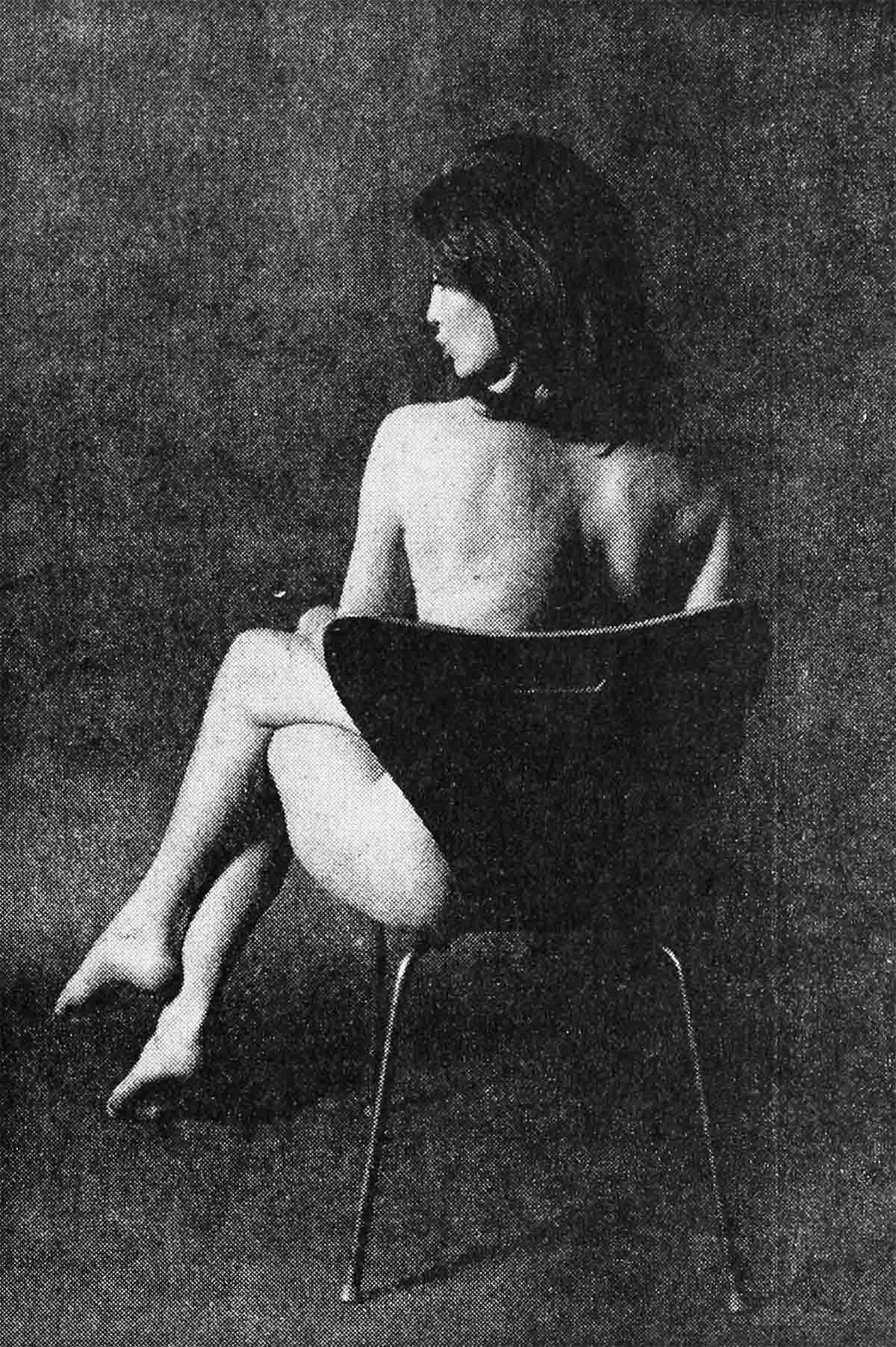
Suddenly Stephen called out:
“Christine, I dare you to swim in the nude.”
Although this suggestion might shock some girls, Christine had no such reaction. Christine and the good doctor, it must be explained, had been sharing a rather absorbing life together for some two years now. Christine lived in Stephen’s diggings in London. “Like a brother and sister,” she said.
“I jolly well will take your dare,” Christine called from the pool—and off came the swimming suit.
One must understand that Dr. Ward is quite a joker. He was always one for livening things up. This time was no exception.
His big chance came when the whoop of a man’s laughter filtered through the huge iron gate of the wall surrounding the pool. In that same instant, two men in dinner jackets walked through the gate. One was Lord Astor and the other man was Jack Profumo.
“I was terrified,” Christine said. “I called to Stephen to throw me my bathing suit. But he tossed it into the bushes. Then he laughed his head off.”
Christine had only one thought in her mind now.
“I knew I was as naked as the day I was born—and I swam like mad to get away at the far end of the pool.”
The sight of a lithesome nude cutting through the moonsplashed water must have invigorated the dignified war minister after a heavy repast at Lord Astor’s manse. Like a ruddy high-stepper in pursuit of mirthful diversion, the Hon. Mr. Profumo bolted after Christine. But the war minister didn’t pursue his attractive quarry for very long.
“Nevertheless it scared me,” said Christine as she recalled how she ran out of the pool, grabbed a towel, wrapped it around her, then turned to face the two visitors with her acute embarrassment still showing.
Lord Astor made the introductions.
“I felt like such a fool, standing there clutching that rather inadequate towel around me, my hair in strings, and water pouring off me,” Christine related.
As if that wasn’t enough of a sticky wicket to be in, Christine all at once was terrified to hear more voices. Following the gentlemen out to the pool—at a more sedate pace—were Lady Astor, who is the once-famed model Bronwen Pugh, and Mrs. Profumo.
It was Mrs. Profumo’s eyes which narrowed into a straight and stinging stare at the indelicately-clad Christine.
“My dear, don’t you have a bathing suit?” Valerie asked haughtily.
Christine’s reply was the English version of “glub.”
“I couldn’t possibly tell her that Stephen had thrown my bathing suit away, let alone explain how I took his dare to swim nude.”
Valerie offered her own swim suit to Christine.
“So,” Christine says now in looking back, “I not only met her husband but I also took her bathing suit.”
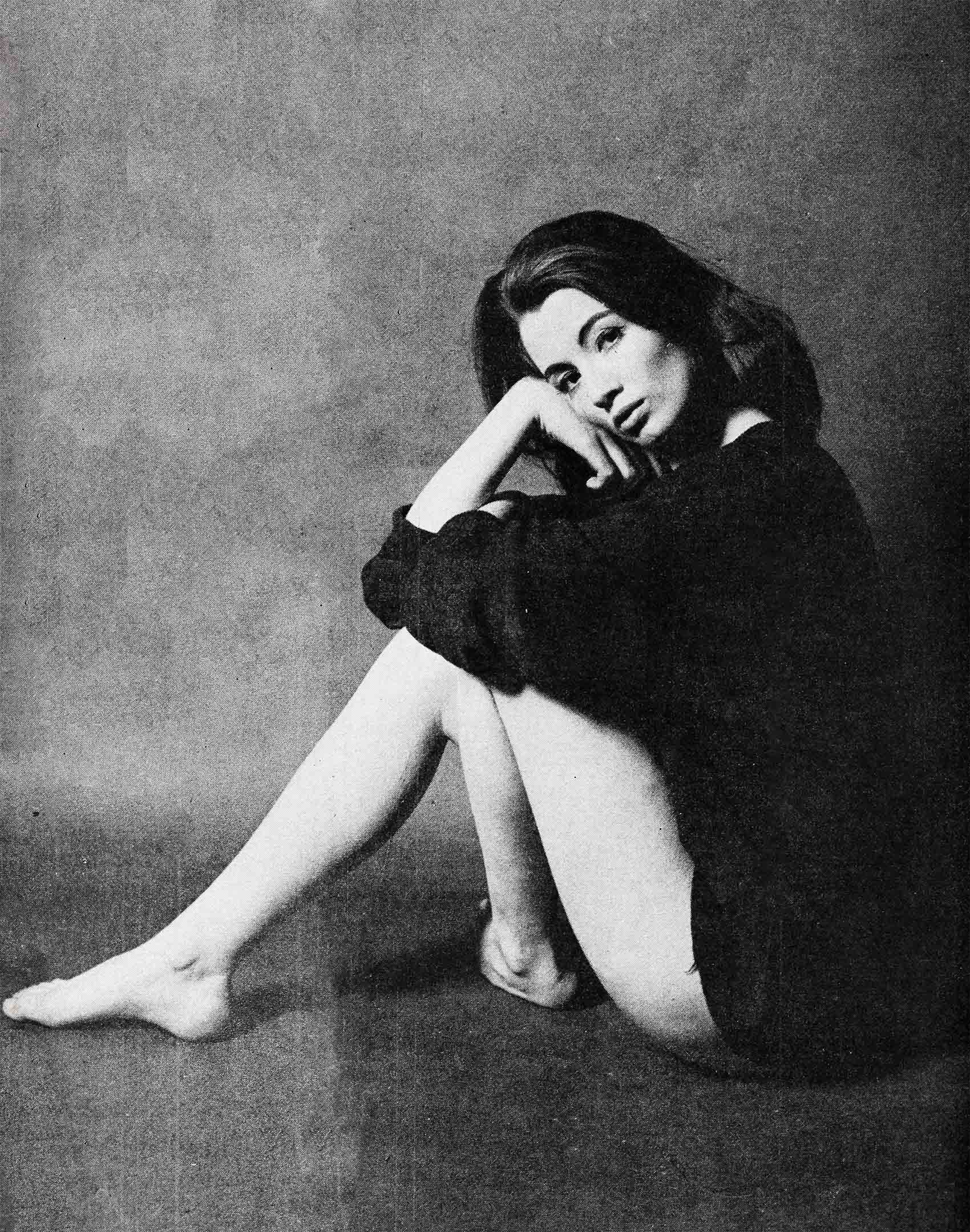
Blame it on Fate
That was how it started. Christine admits she hadn’t planned things that way. “ft was just Fate, like so much of all the trouble has been Fate,” she observes now.
Christine didn’t feel like swimming after this and so she got dressed. Lord Astor then invited her and Stephen to join his guests in his famous country home where, Christine admits, she noticed that the war minister had eyes only for her—and she for him. Later, after some friendly chitchat and a round of hi-jinx that involved dressing Christine in a suit of armor, Jack invited the visitor to accompany him on a guided tour of some of the rooms in the house.
It was in the gun room that the Hon. Mr. Profumo introduced Christine to one of the practical theories of warfare known as tactical envelopment. Christine puts it a different way.
“He walked me into a corner and grabbed me—and I liked it.”
The war minister and Christine declared a “cease-fire” before the siege got out of hand, but they mutually promised to renew the encounter on more accommodating terrain.
That opportunity didn’t come up for some time. Meanwhile, after this get-together, there was another gathering at Cliveden at which Christine and the war minister got to know each other better. Christine was driven out this time by the Soviet assistant naval attache in London, Captain Yevgeny “Eugene” Ivanov, whom Christine had met through the good doctor some time before.
Ivanov had visited their apartment in Wimpole-mews frequently. Most of the visits were social, but on occasion Dr. Ward performed osteopathic therapy on the Russian.
He seemed in fine fettle, however, when he got to Cliveden with Christine, for Yevgeny had no trouble engaging Profumo in a water piggy-back fight. But Christine, who was wearing a bathing suit this time, chose to clamber upon not Ivanov’s but Profumo’s broad shoulders.
Still and all, despite her attraction to Jack, it was the hairy-chested Ivanov who held Christine’s engrossment. And it was with him that Christine drove back to London after the party.
Before leaving, the war minister asked Christine for her phone number and the question when he could see her again.
“Talk with Stephen,” Christine replied in a hurry. “He’ll tell you how to reach me.”
On the ride back to Wimpole-mews, Christine noticed a bottle of vodka stashed in Ivanov’s glove compartment, and when they pulled up in front of the apartment, the bottle went inside with Ivanov and Christine.
A few days after that. Jack called.
“So nice to hear from you. Jack. Why don’t you . . . spin over here?”
He did.
“We drank, chatted, and fooled around in general,” Christine related about her first experience with the man who ranked higher than all the generals of Britain. “He was so gentlemanly, so honest, and so nice . . . I was very fond of him. I could feel myself warming up to him.” The war minister invaded the apartment on a frequent “schedule” after that, but he never stayed long. Magic words that Christine spoke would invariably prompt Profumo’s hasty departure:
“Stephen will be back soon. . . .”
Until finally, on his third visit. . . .
“It happened just like this,” Christine said, snapping her fingers. “One minute we were talking and laughing, and the next there was an electric, potent silence. Then without a word we embraced and he was kissing me.
“And I was returning his kisses with everything that I suddenly felt for him . . .”
Christine and Jack played their game with typically British dead pan flourish. There were times that Stephen and Yevgeny would leave the apartment together only a minute before Jack would arrive.
“Once they almost brushed against each other, that’s how close it was,” said Christine. Once it got even closer.
“There was that amazing evening,” Christine recalls with a chill, “when Jack was in the apartment and an army colonel showed up unexpectedly looking for the doctor. He had a kink in his shoulder and couldn’t raise his arm.
“I had to let him in and when I introduced the war minister, the colonel couldn’t believe it. I never saw a more remarkable recovery. The colonel snapped a smart salute with what had been his ailing arm, about-faced, and marched out.
“Jack nearly died.”
Somehow, Christine goes on to say, she could never reconcile the fact that her lover was the war minister of Great Britain. That sentiment springs purely and simply from Christine’s attitude toward the male of the race.
“I cannot bow down to a man just because he has money or position. I’ve got to like him. And I like Jack as a man!”
As men go. Christine now had three—Ward, Ivanov and Profumo.
As pictured by Christine. Dr. Ward was a man with an extraordinary sense of humor; he loved to stir up a sensation—and the nude Christine bit at the Cliveden estate swimming pool might well remain as the highpoint of his achievements in this area. But he pulled other stunts that ranked up there, and one of these was to put a dog collar around Christine’s neck and take her along the street on a leash.
It was the sort of private joke that would leave any stranger gaping in the street after them.
Ivanov often came along on these jaunts, which inevitably led to some pub. They would sit and drink as if nothing unusual was happening, while the patrons nipping their gin would gaze incredulously at the odd triumvirate. There are reports that some inveterate guzzlers left their pastime and took the pledge after encountering this strange group.
“Ivanov would roar with laughter about it all,” says Christine.
Jack Profumo was quite different than either Ivanov or Ward, says Christine.
“Jack was a wonderful lover but not much for doing anything else,” Christine confides. “Occasionally, however, he would take me for a drive in a big, black limousine borrowed from the Minister of Labor. Mr. John Hare. The car had a silver hare on the hood as a mascot.”
Despite Christine’s and Jack’s extreme discretion in their relationship, a day finally came when the cloud they both dreaded descended all at once on them. It was a visit from an MI 5 man—a British Intelligence Service agent.
“Who’s Christine Keeler?”
He wanted to know from the war minister who Christine Keeler was and what role she was playing in Ivanov’s life, since he was such a steady visitor to the Wim-pole-mews flat. After that Profumo and Christine kidded about Ivanov, but the war minister never seemed to fully trust the Russian.
When the whole sordid epilogue was written on this obloquy which might polish off the Macmillan government, the truth came out that lover-boy Ivanov was after more than Christine’s ample charms. He was trying to get Christine to pump Profumo for the date nuclear warheads were to be supplied to West Germany.
This revelation came in a heated debate before a shocked House of Commons as Macmillan stood ashen-faced and dabbing a handkerchief to his eyes, listening to Labor Leader Harold Wilson bare the details of the spy plot and the hanky-panky that suddenly seemed to turn the British Empire into a moral wasteland and London into a Babylon-on-Thames.
“A triumphant success for the Soviet espionage authorities,” shouted Wilson. “This sex and security scandal indicates it is the work of a sordid underworld network. . . . There is something utterly nauseating about a system of society which pays a harlot five times as much as it pays its Prime Minister.”
Some observers feel Macmillan brought on his own troubles, for he had had ample opportunity to clean out his own house long before the mess reached its present proportions. That was back in March, when Colonel George Wigg, the Labor Party expert on defense, bolted to his feet and charged there wasn’t one member of the House who had not heard rumors about a member of the cabinet. He did not mention John Profumo by name, but he didn’t have to.
House Leader Iain MacLeod at once sent for the war minister, and the next day Profumo went before Commons, stood shakily on his feet, and admitted he had been on “friendly terms” with Christine. Yet he professed there had been “no impropriety whatever.”
He also denied he had anything to do with Christine’s failure to appear at Old Bailey as the star witness against a West Indian Negro, John Edgecomb, thirty, who was charged with trying to shoot up the diggings at Wimpole-mews in anger at Christine and a girlfriend, Mandy RiceDavies, a tall blonde who, like Christine, euphemistically called herself a “model.”
Scarlet women
Mandy was now living with Christine and the doctor, who was slowly coming into Scotland Yard’s sights allegedly as a bloke maintaining a stable of scarlet women—and living on the proceeds of prostitution, rather than osteopathy.
The shooting occurred last December fourteenth, which ostensibly was sometime after Profumo’s interest in Christine had faded. A newspaper later was told that Profumo had stopped seeing Christine because of her interest in Edgecomb and another West Indian Negro, Aloysius “Lucky” Gordon, thirty-one. But Profumo’s link to Christine did not become public as yet.
That didn’t happen until April eighteenth. Then all hell broke loose. This was the day Gordon attacked Christine outside the flat of a girlfriend she was visiting, obviously to silence her as a witness against his buddy, Edgecomb. Gordon was arrested.
Scotland Yard then quickened its inquiry. Mandy Rice-Davies had the arm of the law put on her for a traffic offense and was brought in for the grill. Later she revealed that she gave authorities everything they wanted—including a poem she’d written “about the men Christine and I met.”
As the probe led to Dr. Ward, he openly accused Profumo of indiscretions with Christine—and the fuse on the powder keg was lighted.
The final explosion came when Profumo returned to the House of Commons, and in an unprecedented admission told he members he had lied when he denied “impropriety” with Christine. He offered his resignation. Macmillan, who had stood behind Profumo until that terrible moment, then dictated a curt acceptance.
John Profumo’s brilliant political career now lay in the junkheap of fallen facades and ruined reputations.
Edgecomb got his come-uppance at Old Bailey when the judge slugged him with a seven-year jail term; Gordon drew three years.
Captain Yevgeny Ivanov was recalled by his own government to Moscow because, among other things, his usefulness as a spy was at an end. There, at this writing, he is being given “psychiatric treatment”—which in Russian means he’s in jail.
As mentioned before, Ward had the arm put on him, too.
In addition to all this, hundreds of millions of dollars were lopped from the value of stock market shares because of the blow Macmillan’s government suffered in its severely weakened chances of re-election.
And many influential Britons cowered in palpable terror lest their names be exposed in what rapidly became the greatest probe into call-girl activities ever conducted in London.
Even as this story went to press, more than two hundred high-society hustlers had been interrogated by Scotland Yard, and a six-hundred-page dossier on the girls’ manager and clients was compiled.
Christine’s discovery was also connected in a way with the uncovering of a call-girl ring that had been operating at the United Nations in New York for about eleven years.
The notoriety, of course, has made Christine “big business.” She has formed her own corporation : Christine Keeler. Limited. (Wag’s question: “What’s so limited about her?” Answer: “That ‘Limited’ is a perfect example of British understatement!”) Then it was announced that Christine would play the lead in the movie version of her life: “The Christine Keeler Story.” The film was scheduled to begin production in Copenhagen, Denmark, in late June, but Christine was still tied up with the London investigation then, and was unable to leave the country, much as she’d probably like to!
If it isn’t one thing. . . .
Besides, there were rumors that Christine was (unaccountably?) having trouble getting an Equity card, without which she wouldn’t be able to act.
There were those, too, who felt that the movie shouldn’t ever be made—but the backers had no intention of calling off the production. The British have no immunity to scandal—why should they not “get what’s coming to them!”
And once again, the British—who can run scandals the way no other nation can—must recover from this last blow which follows so many others.
First, the loss of the colonies.
Then the decline of the Church as an influence in society.
And now Christine Keeler. One nude dip in the pool by a woman of easy virtue and—pffft. The whole empire totters.
THE END
—BY GEORGE CAMBER
It is a quote. PHOTOPLAY MAGAZINE SEPTEMBER 1963


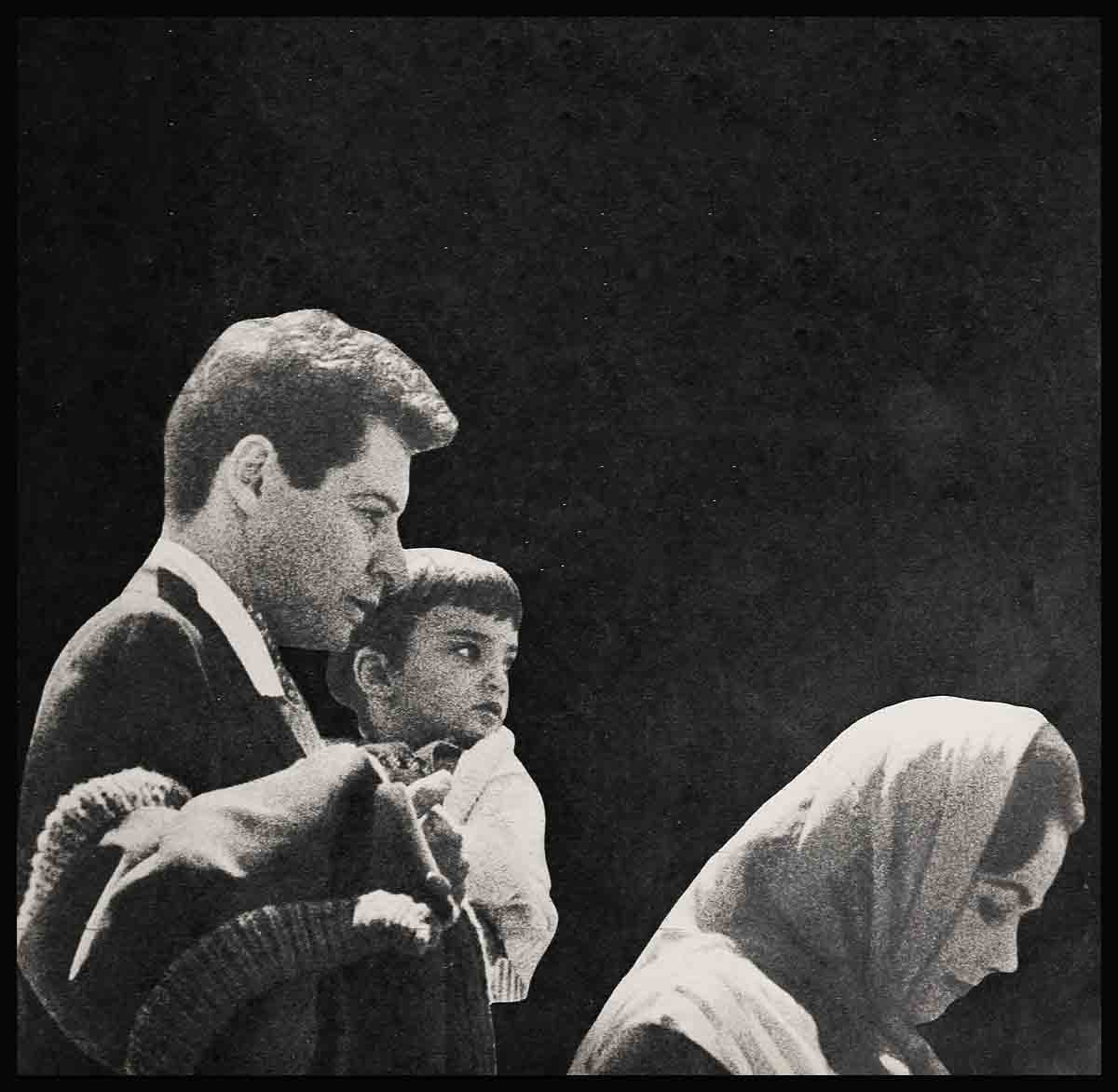
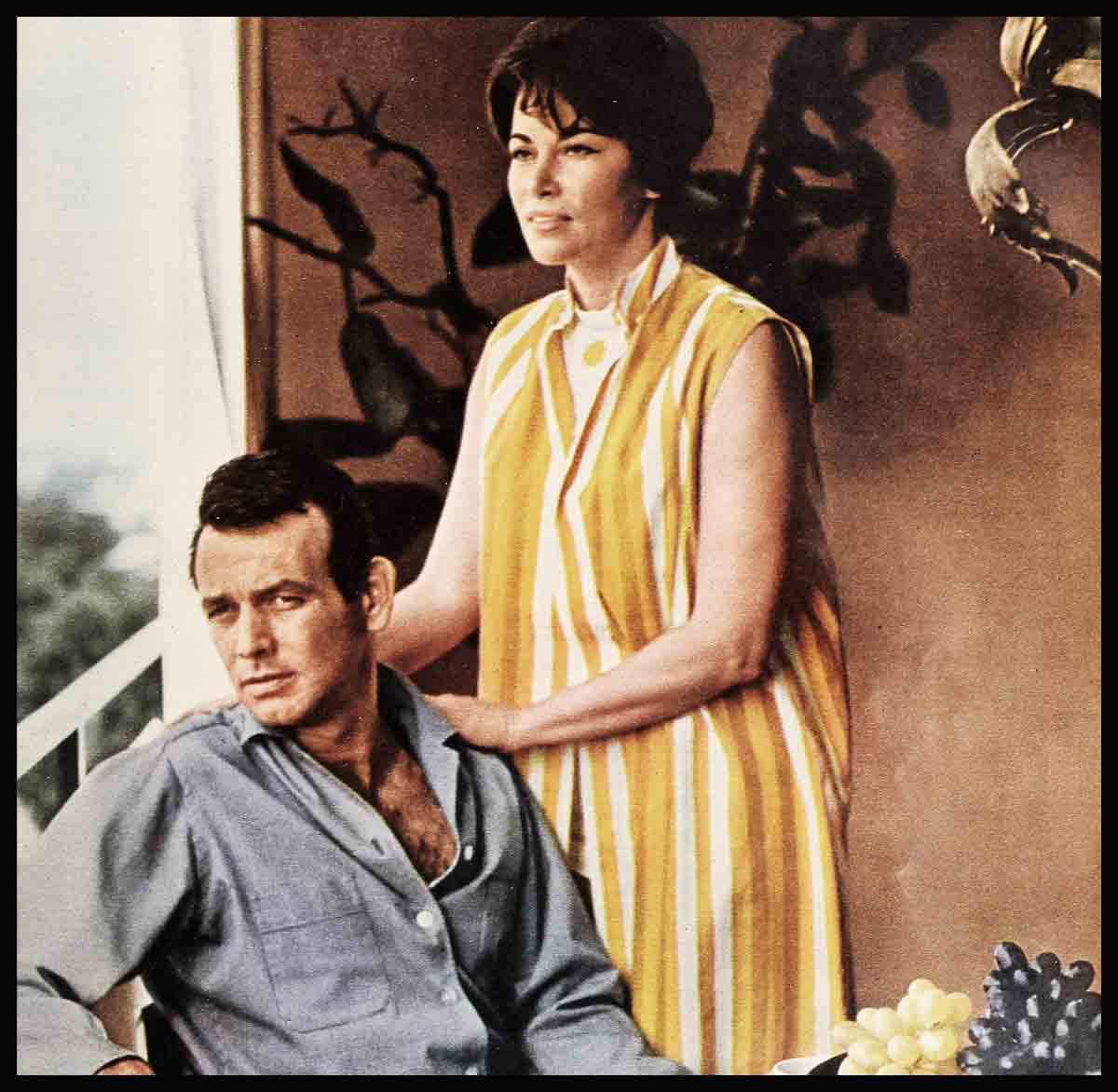

No Comments